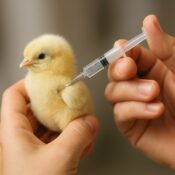How Often Should I Feed My Chickens?
Feeding your chickens the right amount and frequency of food is crucial for their health and productivity. Here's what you need to know about feeding your flock.
1. Daily Feeding Routine: Chickens should have access to food every day to meet their nutritional needs and maintain their health. Provide a consistent feeding routine to ensure they have access to fresh food throughout the day.
- Offer food in the morning and evening to coincide with their natural feeding patterns.
- Ensure feeders are filled with enough food to last until the next feeding time.
- Check feeders regularly to make sure they are clean and free of debris.
- Fill feeders with enough food to last several days, depending on the size of your flock.
- Use gravity-fed or treadle feeders to ensure a constant supply of food.
- Monitor feed consumption to ensure chickens are eating enough but not overeating.
- Watch for changes in appetite, such as decreased or increased feed consumption.
- Adjust feed quantities as needed based on the size and age of your flock.
- Provide additional feed during times of stress, such as extreme weather or molting.
In conclusion, feeding your chickens regularly and providing a balanced diet is essential for their health and well-being. By following these guidelines and monitoring their feed consumption, you can ensure that your flock stays happy and healthy.
- Offer treats like mealworms, fruits, vegetables, and grains as a supplement to their regular feed.
- Limit treats to no more than 10% of their total diet to prevent nutritional imbalances.
- Avoid feeding toxic foods such as avocado, chocolate, and onions.
- Provide starter feed for chicks up to 8 weeks old, then switch to grower feed until they reach maturity.
- Layer feed is formulated specifically for laying hens and contains the extra calcium they need for egg production.
- Broilers may require higher-protein feeds to support rapid growth and development.
- Clean and refill waterers daily to prevent contamination and ensure freshness.
- Provide water in multiple locations to prevent overcrowding and ensure all chickens have access.
- Check waterers frequently, especially during hot weather, to prevent dehydration.
Recent Posts
Poultry Pals
Chicken Lady No. 1 Memory
Poultry Pals
The first Chickens April 2020
Poultry Pals
Mycoplasma Vaccination
07967 974115
info@poultrypals.co.uk



